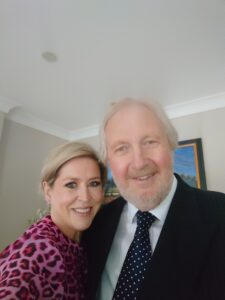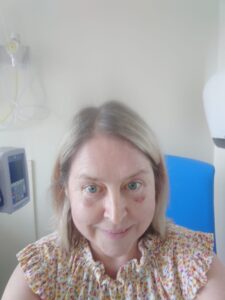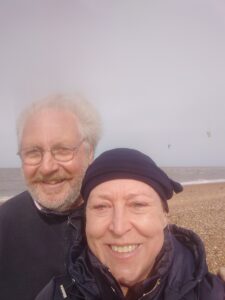
26 Jun 2025
Rare APML diagnosis changes Clare’s life
“I likened it to being conscripted to fight a war; suddenly leaving everyone behind and fighting alongside strangers, some of whom became friends, some who didn’t make it, some who did and some who you had to leave still fighting when you were told your war was over.”
“Looking back, I’d had feelings of intense fatigue for a while, but I put them down to a busy job as a senior manager with the Royal Mail, plus some caring responsibilities for my father,” said Clare McMillan, 55, who lives in Northamptonshire. “I wasn’t sleeping well and had terrible night sweats. B
In May 2023 whilst on holiday in Shropshire, Clare developed severe abdominal pain on her right side. She went to the local A&E and was told it could be appendicitis. She also had two blood tests.

Clare McMillan before diagnosis
Doctors eventually concluded that Clare didn’t have appendicitis, so Clare was sent home and told she would get her test results from her GP back in Northamptonshire soon.
When Clare returned from holiday, it was the late May bank holiday weekend. Her GP rang and told her to get to A&E immediately.
“She said my platelets were 79. I now know they should have been around 150 – 400 × 10⁹/L. My white blood cell count was 0.8 when a normal range is 4 – 11 × 10⁹/L. But at the time, I didn’t know why it was important or what it all meant.”
Clare was admitted into a ward but after two days of more blood tests and questions, she was sent home again and told to attend a follow up emergency clinic appointment, as there was nothing they could do over a bank holiday weekend.
“Looking back, I had felt tired – sometimes I could barely keep my eyes open in meetings at work. But it is so difficult to see a GP and I felt I couldn’t go just because I was feeling tired, especially as there were lifestyle factors that might explain it. So I just kept going, trying to have early nights when I could. It was only when I had the severe abdominal pain that I sought medical help.”
After the weekend, Clare went back to the hospital for an emergency clinic appointment and was referred for a bone marrow biopsy.
“Again, they didn’t explain clearly to me what they were looking for. I was very blasé about it and didn’t ask. I was told it would be around six weeks until I got the results. However, I got a phone call the next day to tell me to get to Kettering General Hospital haematology ward to be admitted. I was told over the phone that I had leukaemia.”
On 8th June 2023, Clare was diagnosed with acute promyelocytic leukemia (APML).
APML is a rare sub-type of acute myeloid leukaemia (AML) – just 160 people in the UK are diagnosed with it each year. At one time it was the most fatal of all leukaemias, but thanks to research, APML now has one of the highest cure rates. New drugs are available alongside the traditional chemotherapy, which target the specific mutation which causes APML – the PML-RARA fusion gene. There is now a cure rate of over 90%, provided it is caught early and diagnosed correctly.
“It was a complete shock. I remember when the doctor said I had leukaemia, I stood up, my legs went to jelly and I fell back into the chair. I cried very briefly but then went to pack a bag and my husband, Andy, drove me straight to the hospital. I couldn’t really take it in. I had no idea there were so many different types of leukaemia and I had never heard of APML. “

Claire during treatment, vomiting caused by the treatment also caused black eyes
Clare was put on chemotherapy and given multiple platelet, plasma and blood transfusions.
“I remember the night before my chemo was due to start, I was having a bit of a cry to myself. A nurse came into the room and whilst I tried to hide it, she knew I was crying. She took my hand and I told her I didn’t think I had it in me to get through the chemo. Rather than just say I would, she said, ‘think about the memories you have made with the people that you love and say to yourself that if you can get through this, you will make more.’ That advice gave me the determination to get through it all.”
Clare also appreciated having the support of her husband, Andy, and her wonderful friends.
Clare’s treatment was challenging and the chemotherapy made her very sick. She also developed Differentiation Syndrome, a potentially serious reaction to the drugs she was given which is seen in those with APML.
Clare was eventually discharged in August, continuing her treatment as an outpatient.
“I felt so safe and cossetted in hospital, it was a difficult transition. Everything is mapped out for you there but once you get out, you have to stay on top of appointments and get into a new routine, at the same time as fitting back into your old life.
“I likened it to being conscripted to fight a war; suddenly leaving everyone behind and fighting alongside strangers, some of whom became friends, some who didn’t make it, some who did and some who you had to leave still fighting when you were told your war was over.”

Claire after treatment
Clare has been in remission since May 2024 and now only needs checkups every six months. She is recovering well, but her mental and emotional recovery is taking longer. Clare returned to work but has since taken a career break to enjoy much-needed time to focus on herself.
“Going through something like this made me realise how research is finding new treatments for cancer all the time. Apparently the treatment I was put on only started being used in 2018. All I want now is to remain in remission, enjoy time with Andy and my wider family, do the travelling we always talked about and then decide where life will take me next.”
Related posts
17 October 2022
New campaign launches for the forgotten 500,000 families
Patient groups, charities and clinicians unite to raise awareness of half a million vulnerable people, many of whose lives have never returned to normal after the Covid-19 lockdown. A new…
20 September 2021
Leukaemia charities unite in Blood Cancer Awareness Month to improve diagnosis and the chances of survival
Leading UK leukaemia charities Leukaemia Care and Leukaemia UK have announced a new collaboration to increase awareness of the signs and symptoms of leukaemia and drive improvements in the diagnosis of the disease. The campaign, Spot Leukaemia, is running throughout September – Blood Cancer Awareness Month.
5 July 2023
UK’s top chefs unite at gastronomic spectacular to raise funds for life-saving leukaemia research
Twenty of the most accomplished and innovative chefs from the UK food scene will gather at The Dorchester on Monday 18th September 2023 for ‘Who’s Cooking Dinner?’, a one-of-a-kind night…
28 November 2022
Leukaemia UK John Goldman Fellow awarded Professorship
Talented blood cancer researcher, Vignir Helgason, was awarded a Leukaemia UK John Goldman Fellowship in 2015, for his research into chronic myeloid leukaemia (CML). Since then, his research career has…